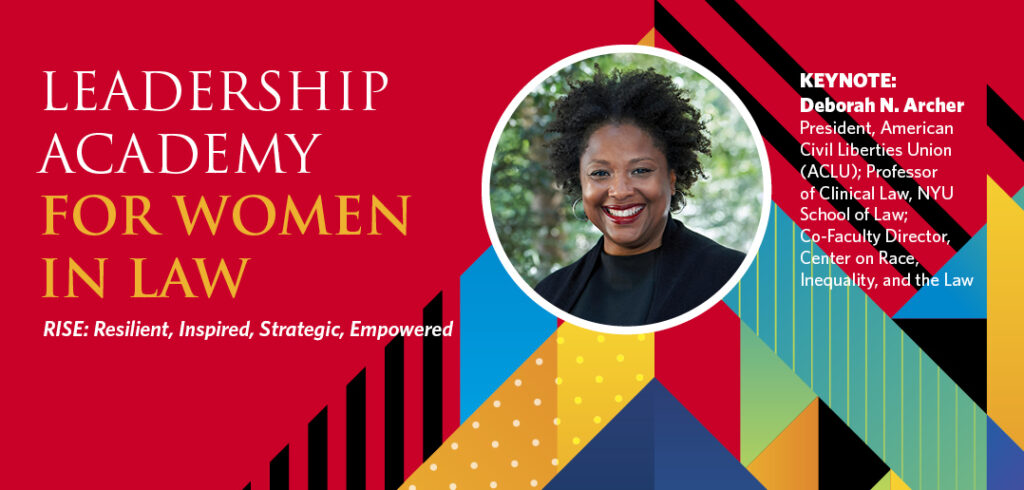On September 24, more than 120 female lawyers and law students, along with male allies, attended the first week of the RISE Leadership Academy for Women in Law, an eight-week-long online program designed to empower women working in law to pursue leadership positions.
Participants from a dozen countries attended the event, coming from a range of legal experiences. The morning meetings are scheduled to take place over the next eight Fridays and will include speakers from a variety of backgrounds, including private practitioners, in-house counsel, government attorneys, and scholars.
“Over the coming weeks, we will explore strategies that women can use to enhance their leadership capabilities in the profession, and that men can adopt to help make our profession more diverse, equitable and inclusive at all levels,” said Assistant Dean of International and Non-J.D. Programs Toni Jaeger-Fine, in her opening remarks.
Inspiring Words from ACLU President Deborah Archer
The program’s keynote address was presented by Deborah Archer, a professor of Clinical Law at the NYU School of Law and president of the American Civil Liberties Union (ACLU).
In her work at the ACLU, Archer has been instrumental in tackling some of the greatest threats facing American civil liberties today, like women’s reproductive rights, access to voting, and other forms of discrimination.
“I know, as you know, that progress towards equality will not happen on its own,” said Archer, “it certainly won’t happen if we wait on others to make it happen. We need your leadership. And as we reflect on the current moment, it’s important for each of us to ask ourselves, why are we called to lead? Why me? Why now? Why here?”
As the child of Jamaican immigrants, Archer described the hardships her family endured while she was growing up, including having their home vandalized with the words “KKK” after moving into a mostly white neighborhood.
“I was about nine or ten years old and my parents had to explain to me and to my younger brother who the KKK were and why some of our neighbors didn’t want us there,” she said. “I figured out very early on that I wanted to fight against the discrimination that my parents had to navigate every day that sought to drive my family from our home.”
Archer went on to become the first person in her family to attend college and eventually became the first person of color to be president of the ACLU.
“I became a civil rights lawyer because I wanted to fight for the rights of people like me, and for families like mine. For the freedom to live without discrimination and to live with dignity and respect,” she said.
After hearing the keynote address participants had the opportunity to meet in small groups and share their experiences while reflecting on the remarks made by Archer.
The Leaky Pipeline
As Fordham Law School Dean Matthew Diller noted in his opening remarks, the majority of incoming law students nationally today are women—in 2020 that number was 54 percent, up dramatically from 3.5 percent in 1960. And, yet, leadership positions at law firms are still heavily dominated by men.
A 2017 McKinsey report found that, as their careers progress, women are not well-represented in higher level positions in law, with white women making up 16 percent of equity partners and women of color making up only three percent.
“We have a major problem in the legal profession in terms of ensuring that women have a fair pathway to positions of leadership. Not only is it a matter of finding fair and equal opportunity on an individual level, it’s also critical to our profession and to the role that our profession plays in society,” said Diller.
Future sessions of the Leadership Academy for Women in Law program will include speakers Hilarie Bass, founder of the Bass Institute for Diversity and Inclusion; Sheila S. Boston, president of the New York City Bar Association; Maria-Leticia Ossa Daza LL.M. ’09, partner at Willkie Farr & Gallagher LLP; Palmina M. Fava ’97, partner at Vinson & Elkins, LLP; and Michele Coleman Mayes, vice president and general counsel of The New York Public Library.
See the full list of speakers and learn more about the program here.

